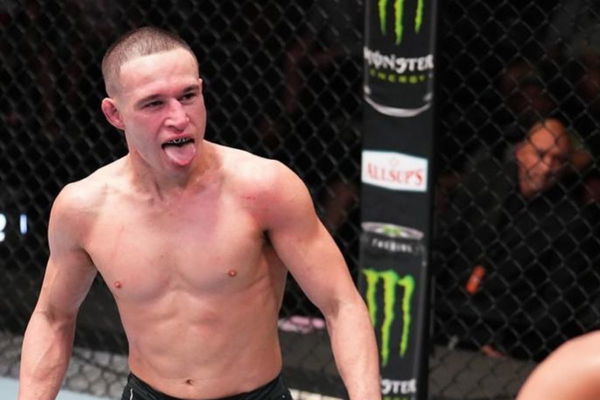

When Kai Kara-France enters the Octagon, he doesn’t come alone. Behind every punch, kick, and takedown is a legacy, centuries of warrior spirit passed down through his ancestors.
Now set to compete for gold at UFC 317, Kara-France stands on the cusp of history. If victorious, he will become the first Māori UFC flyweight champion. But who is the man in the gloves? What beliefs guide him? Let’s explore the roots of ‘Don’t Blink.’
ADVERTISEMENT
Article continues below this ad
Where is Kai Kara-France from? Ethnicity and nationality
Born in Auckland, New Zealand on 26 March, 1992, James Kaiwhare “Kai” Kara-France, holds strong to his Māori heritage. His ancestry isn’t just a part of him, it defines him. He hails from a proud lineage that has connections to the Waikato, Ngāti Tūwharetoa, Ngāti Kahungunu, and Tuhoe.
Former UFC legend Mark Hunt, current heavyweight Tai Tuivasa, and Dwayne ‘The Rock’ Johnson are a few of the combat sports athletes who are of Pacific Islander ancestry.
The connection runs deeper than blood. In Tahiti, while training fighters, he met an elderly woman who traced her roots to the same lineage as he shared, “Where I was staying was a mountain lodge, my friend set it up. His aunt was the owner. Just by coincidence, they whakapapa [trace their lineage] back to Waikato. They’re Tahitians but they have family in and are connected to the iwi Tainui, which is my iwi [nation]. They mentioned to me, they said, ‘You know, the Tainui waka was made in the forest where you’re staying.’
Kara-France says it felt as if he was exactly where he was meant to be. “It’s all surreal and it’s all really connected, and it was like I was meant to stay there and hear these stories,”
View this post on Instagram
What’s your perspective on:
Kai Kara-France's Maori pride: Does his heritage give him an edge in the octagon?
Have an interesting take?
Even though he grew up in a bustling city far from his ancestral lands, his cultural pride never wavered. In his own words, “It’s my identity, it’s my anchor. Fighting is my mahi, it’s what people know me as. But long before I was a fighter, that’s the reason why I’m a fighter, is because of my ancestors, my, and that’s the blueprint I go off because they would’ve been navigating and all these challenges that they’ve had to go through.”
His cultural identity isn’t a footnote; it’s the foundation. With that being said, let’s shift our focus to ‘Don’t Blink’s religious beliefs and what faith guides him on his journey.
Which religion does Kai Kara-France follow?
Kara-France has never publicly discussed his religion. Still, he speaks openly and often about his connection to Māori traditions and spirituality.
The Māori community traditionally embraces a blend of Christianity, especially Protestant faiths, and their own spiritual beliefs. Many Māori hold deep respect for the land, ancestors, and the unseen forces around them. Kara-France seems to draw from this heritage when he fights.
He once shared, “That’s what makes our culture so beautiful. So what I’m doing now in the modern day, I bring culture with me and I want to let everyone know where I come from and I’m very proud of it, be unapologetically Māori.,”
Those words echo a belief in something deeper than rituals or labels. His clarity, strength, and intention often come from looking inward and honoring his lineage. Whether or not he follows a structured religion, it’s clear his spiritual compass points home, to his culture and his people.
ADVERTISEMENT
Article continues below this ad
About Kai Kara-France’s parents and early life
Kai Kara-France didn’t follow a typical path. At 18, he dropped out of university and booked a one-way ticket to Thailand. His destination? A shot at glory. His goal? Becoming a fighter.
Despite some resistance from his family, as his father and brother are both lawyers, he pushed forward. At a tryout at the legendary gym, Tiger Muay Thai, he earned a scholarship and trained there for four years.
Being smaller than his peers while growing up, Kara-France always felt like the underdog. His martial arts journey began at age 10 with Brazilian jiu-jitsu, thanks to a friend’s dad. But bullying in school tested his spirit. He once shared, “I was about 12 or 13. I was always the smallest in my class, always I guess seen as a victim. At one point I didn’t go back to high school. I took a week off. My mum saw the bruises on me and said, ‘You don’t need to go back’.”
ADVERTISEMENT
Article continues below this ad
Today, that same kid is one of the UFC’s most dangerous flyweights. But he never forgot where it all started.
Now, with a title shot at UFC 317 against Alexandre Pantoja, the question isn’t just whether he can win, it’s whether he can make history. And if he does, he won’t just lift a belt. He’ll lift an entire culture with him.
ADVERTISEMENT
ADVERTISEMENT
ADVERTISEMENT
ADVERTISEMENT


Kai Kara-France's Maori pride: Does his heritage give him an edge in the octagon?